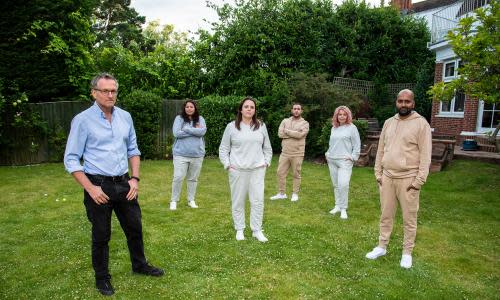Lose a Stone in 21 Days review – a diet show that's hard to stomach

There are two main problems with the new Channel 4 series Lose a Stone in 21 Days, presented by Michael Mosley. The first is that it is incredibly boring. I have lost count of the dietary programmes that follow this format: a group of ordinary folk gather together to overhaul their lifestyles/bodies with the help of a team of trainers, nutritionists and – if the broadcaster is pushing the boat out – a doctor with the scientific kit to show how successful the participants are in following their instructions. Then there is the tracking of their progress over a number of weeks; the emotional breakdowns as feelings rush in; the failsafe phrases such as “I’m going to stay positive” and “I want to be here for my family.” The hunger for insight, nuance and analysis of anything wider than this handful of people and their adipose tissue distribution patterns, or deeper than the difference between a full breakfast fry-up (“In the Fattypuffs’ house, Sean drinks lard straight from the pan. Research has shown that this is not healthy”) and a boiled egg in gravel goes unappeased.
There are so many of these programmes that even the subset presented by Mosley must surely number in the hundreds by now. The corona-twist of having this one take place in Mosley’s home does little to alleviate the grinding tedium. Last week, we did the science part, some tears and an introduction to portion control. The five participants were given the results of tests that showed how far they were along the road to death (I paraphrase, but not much) and put on a very low-calorie diet to slow their journey. Throwing an exercise element into the mix in this second episode did nothing to improve matters. Add to this a noxious whiff of opportunism coming off any programme that uses “lockdown belly” as the new justification for more of the same old, and it becomes an even less attractive way to spend an hour.
The second problem is less tangible, but no less real, and is why the programme drew a lot of ire before and after the first episode aired. The objections mostly centred on the emphasis on calorie restriction (particularly as this plays into many of the specific concerns and practices of people with eating disorders) and a narrow, unhelpful focus on weight loss rather than a holistic approach to eating and health.
With the introduction of exercise to the programme, the second episode may go some way to dissipating the more peripheral objections, but I suspect the central ones will remain. And, for my money, legitimately so. The general conversation around weight, overeating and obesity, and the understanding of the sociocultural influences around them that we swallow as unavoidably as we do the hidden sugars and fats in processed foods has evolved greatly in the last few years, but programming has not kept pace. Handing people a pamphlet and telling them to pull themselves together – which is what it really amounts to – won’t fly on screen now any more than it would in a GP’s surgery.
The whole of Lose a Stone feels off. Partly, it is the laziness of the aforementioned format. Partly, it is Mosley himself, who – perhaps with less directorial and other softening input under Covid conditions – is a crucial few degrees less personable than usual here. The presence of his family – GP wife, Clare, son Dan and daughter Kate – might have leavened things, but, in fact, the overall effect is to create an air of smugness around the endeavour. The – I am absolutely sure unintended – message, with Clare and Michael so slim and clearly disciplined and Dan a fitness fanatic, is that all these people have to do is Be More Mosley! And with no acknowledgement of the kind of lives and capital – social and otherwise – that are needed to devise and follow a healthy existence (or which at least make it a hell of a lot easier), it seems as if moral judgment is being made at every turn.
Again, I’m sure it is not: but that is the effect. That is what makes the viewing, when not merely boring, uncomfortable. That is why it is hard to stomach this kind of thing any more.

 Yahoo News
Yahoo News 